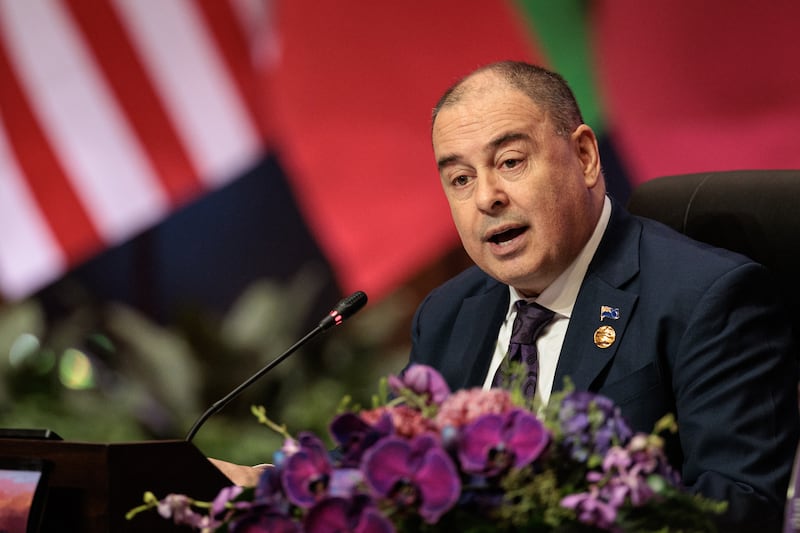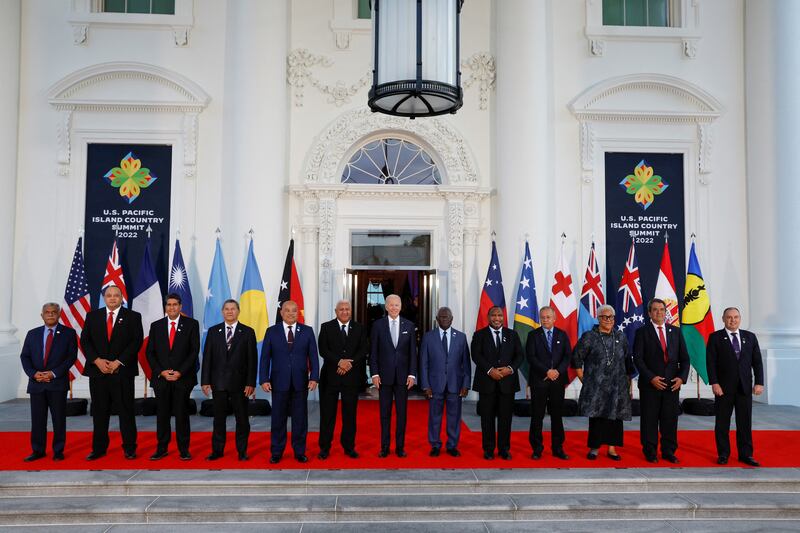Updated at 3:50 p.m. EDT on 2023-09-21
Pacific island leaders are calling for tangible outcomes from their summit next week with President Joe Biden – the second in a year – as the United States continues a charm offensive in response to China’s inroads in the region.
Recent statements from Pacific leaders show the countries have doubled down on a strategy for responding to the superpower rivalry in their backyards. They hope the explosion of attention on their region, previously treated as a backwater, can be redirected into serving its neglected needs. As part of that they insist they won’t take a side in China-U.S. rivalry – despite the obvious differing loyalties among governments in the region.
“For the Pacific, we do not have time to concern ourselves with geostrategic posturing, positioning and influence or to sail to the narrative of others,” Cook Islands Prime Minister Mark Brown said in a speech to a Carnegie Endowment event in New York this week.
“We will partner with all who are willing to engage with us on our terms and in alignment with our priorities,” said Brown, who is also chairman this year of the Pacific Islands Forum, an 18-nation regional grouping.
U.S. interest in Pacific island nations was galvanized in early 2022 after Beijing and the Solomon Islands signed a security pact that the U.S. and allies such as Australia fear could lead to a Chinese military presence in a region they consider crucial to their defense and security.
Since then the U.S. has agreed to increase its financial and economic assistance for Micronesia, Marshall Islands and Palau – three North Pacific countries that delegate their defense to Washington under longstanding compacts of free association.
In the South Pacific, the U.S has added to its diplomatic presence by opening embassies in the Solomon Islands and Tonga, but both have limited staffing and no ambassadors. Last month the United States Agency for International Development opened an expanded aid mission headquartered in Fiji.
Recent U.S. rhetoric about the Pacific has been filled with buzzwords such as engagement, partnership and “showing up.” However, over the past two decades it is Chinese aid and Chinese state companies, not American aid and companies, that have come to occupy a leading role in meeting the infrastructure needs of economically lagging island nations.
“We are looking for more tangible engagement,” said Brown, in areas such as trade, air links and easier access to climate finance. “So we look forward to this summit coming up with optimism.”

The combination, he said, of superpower competition, international attention on the Pacific and the current degree of unity among Pacific island nations is a rare opportunity to shape events in their favor.
Wilson Thompson, chairman of Papua New Guinea’s National Research Institute, said some U.S. projects in the country aren’t flattered by comparison with China’s.
One example, he said, is the 54-megawatt Edevu hydro dam built by a Chinese company that will supply the blackout-prone capital Port Moresby with electricity.
An electrification project that the U.S. is involved in with Japan, Australia and New Zealand – which started in 2018 and aims to bring power to 70% of Papua New Guinea – is having less impact with its focus on small-scale solar power, Thompson said.
“Papua New Guineans were thinking Americans, the Australians, the Japanese were going to build power pylons, connecting the electricity to people, but they came up with solar lights,” he told BenarNews.
“These kinds of projects have no impact in the country and no impact on the concerns of the people,” he said. “Papua New Guineans are saying that look, the Chinese are already providing solar lights in the stores, cheaper.”
The first Pacific Islands-U.S. summit in September last year announced plans for more than U.S. $800 million in assistance to island nations over a decade. The figure included nearly tripling the payments tied to a tuna fishing treaty with Pacific nations to a total of U.S. $600 million between 2023 and 2033. A State Department spokesperson said Thursday the economic assistance agreement for the tuna payments went into effect on Sept. 14.
On the security front, the U.S. has agreed to help equip Australia with nuclear powered submarines by next decade and recently signed a defense cooperation agreement with Papua New Guinea that will give it access to six air and sea ports.
This year, U.S. President Biden will meet Pacific island leaders at the White House on day one of the two-day event, his office said in a statement earlier this week confirming the Sept. 25-26 summit.
Beijing’s influence in the Pacific has increased over the past two decades through a combination of trade, infrastructure and aid as it seeks to isolate Taiwan diplomatically, gain allies in international institutions and advance its economic and security interests.

The Solomon Islands and Kiribati switched their diplomatic recognition to Beijing from Taiwan in 2019. Solomon Islands Prime Minister Manasseh Sogavare last week said the switch was by far the country’s most important decision in decades. The Pacific island nations of Palau, Marshall Islands, Nauru and Tuvalu are among the 13 countries that continue to recognize Taiwan.
The Pacific island countries, mostly small in population, are spread over vast areas of ocean and have claim to giant exclusive economic zones. Some such as Tuvalu and Nauru each have little more than 10,000 people while Papua New Guinea with nine million people is the most populous.
“For far too long now, we have been regarded as mere dots or specks in the great Pacific Ocean,” said Henry Puna, secretary-general of the Pacific Islands Forum who also spoke at the Carnegie event.
The geopolitical tussle between the U.S. and China is resulting in “quite frankly, strategic manipulation” in the Pacific, he said. But island nations, Puna said, must capitalize on the competition to bring long-term benefits.
“If I’m honest, we must realize that the strategic interest and attention that we enjoy today will not last forever,” Puna said.
“What we are seeing is a lot of engagement at all levels, but with little concrete action or commitment.”
Tess Newton Cain, a Pacific analyst at Griffith Asia Institute, said Pacific leaders are making it clear they know that the interest in the region from the U.S., China and other nations isn’t out of altruism.
They are saying, she said, “we know there are geostrategic elements to this but we’re not just going to be tossed and turned, we’re going to play a part in how this plays out.”
The summit in Washington is a prestigious event but following the first summit Pacific island leaders and policymakers are developing a keener understanding of the possible gap between what political leaders promise and what the machinery of the U.S. government delivers, Newton Cain told BenarNews.
“There’s already a sense in the region that the U.S. says great things but getting them to deliver stuff on the ground is a lot harder,” she said.
